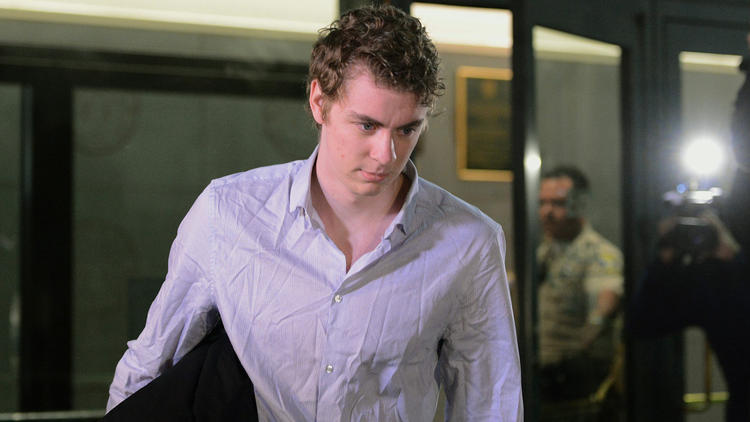Brock Turner and His Role in Modern Sexism and Rape Culture
Brock Turner leaves the Santa Clara County Main Jail in California after serving only 3 months for rape.
September 21, 2016
On the night of January 8, 2015, two graduate students were biking around the Stanford campus when they found Brock Turner, a freshman attending Stanford University, raping a 23 year old woman behind a dumpster next to a fraternity party. Both Turner and the victim were reportedly intoxicated, and the victim was laying unconscious while Turner was assaulting her. Immediately, the two witnessed chased Turner and held him down until the police arrived (The Atlantic).
Turner was arrested that night, but pleaded not guilty to five felony charges in February. He was released on a $150,000 bail. On October 6, he attended his first hearing with his defense attorney, Michael Armstrong, and again, pleaded not guilty. This resulted in two charges of the original five being dropped. Almost half a year has passed until Turner was put on trial on March 30, 2016. He was finally found guilty, and faced years of jail time. However, his victim did not receive the justice she was expecting; Judge Persky, the judge who decided Turner’s jail time, only sentenced him to a mere six months (US Magazine).

The Santa Clara Sheriff’s Department realeases Turner’s mug shot more than 14 months after his arrest.
The public was outraged; Usually, “the average prison time for rape is between 8 and 9 years” (Sex Offender Attorney). Judge Persky’s reasoning for Turner’s lenient punishment was because Turner had a “clean criminal record” and that a longer sentence would have “left a severe impact on him” (US Magazine). This sentence alone is extremely ironic; Turner’s reckless actions has affected his victim more than jail would ever effect him. He has “distorted [her], damaged [her], and almost broke [her]” (Buzzfeed).
Judge Persky’s unreasonable and unfair decision sparked public frenzy and massive protests of activists seeking justice for rape victims. Currently, there is a petition on www.change.org for the impeachment of Judge Persky, and over 1.3 million people have signed it already. Because of the great amount of people who don’t want him to continue serving on criminal trials, he officially transferred to the civil division in the beginning of this month (The Atlantic).
Turner was recently released on September 6, 2016. He only served three out of the six months before he was let out due to “good behavior” (Rolling Stone). According to Daily Mail, he went home to the suburbs of Ohio, where many armed protester gathered outside with signs reading “Shoot you local rapist” and many more threatening messages. Turner is required to register as a sex offender for life, and will not be able to go anywhere near schools.
Turner’s parents are also a topic of controversy. Carleen Turner, his mother, wrote a letter to the judge that pleaded against prison time by saying that “he would be damaged forever” if he were to be sent to jail (Fox News). This made people angry because of her disregard to how her son’s actions has affected his victim permanently. Similarly with Turner’s father, he wrote a letter to the judge before his son’s sentencing, attempting to persuade Persky not to send Brock to prison. He wrote that jail is a “steep price to pay for 20 minutes of action” (News Channel 4). The way he views his son’s assault speaks a lot about his character. He clearly doesn’t acknowledge that what his son did was a crime; he doesn’t respect the victim by referring to her as merely “20 minutes of action”.
The victim also spoke out about this traumatic experience. At his sentencing, the victim read him a letter that described the pain he has caused her, and her written letter was released on Buzzfeed. She said that she was “too drunk to consent” and that “[she] should not have been touched in the first place.” Also, she expressed her frustration of how sexist Turner’s attorney was. He was asking her meaningless questions such as “What were you wearing?” and “How much did you drink?” The questions were useless because it did not give Turner a reason to rape her. These questions are a perfect example of the rape culture that is prevalent in society. People always want blame the victim and try to use excuses like how she/he was dressed or how intoxicated they were to try and justify the rapist’s actions. Society needs to change their victim-blaming ways of thinking, and start treating rapists as criminals, and not as someone who deserves sympathy or leniency.
The People v. Turner case played a bigger role in society than people think; the attention it has gained on the internet and the news has put the issue of rape in the spotlight. However, people still have a hard time placing the blame on the correct person. Many people on the internet like to blame the victim, and even state that “if she didn’t want it, she wouldn’t have dressed like that” or “drank that much” (Fox News). This is a problem that has to be fixed. Stanford has banned hard alcohol at parties to prevent rape, but alcohol is not to blame of the actions of a rapist. The blame should not only be on the rapist, but on the media and parents who teach young girls not to walk alone late at night and wear “revealing clothing.” More than 75,000 women have been raped during the three months Turner was in jail, and this number does not include the people who haven’t reported their rape (Vox). However, we shouldn’t be teaching young girls to be afraid while they are out by themselves at night. Instead, we should be educating men and women not to rape, and to treat everyone with kindness and respect so that young girls can feel safe and not worry about predators that lurk in the shadows. But for a perfect society to form, we need to shape it first. We need to fight for a better future, and we need to realize that No. Means. No.





































